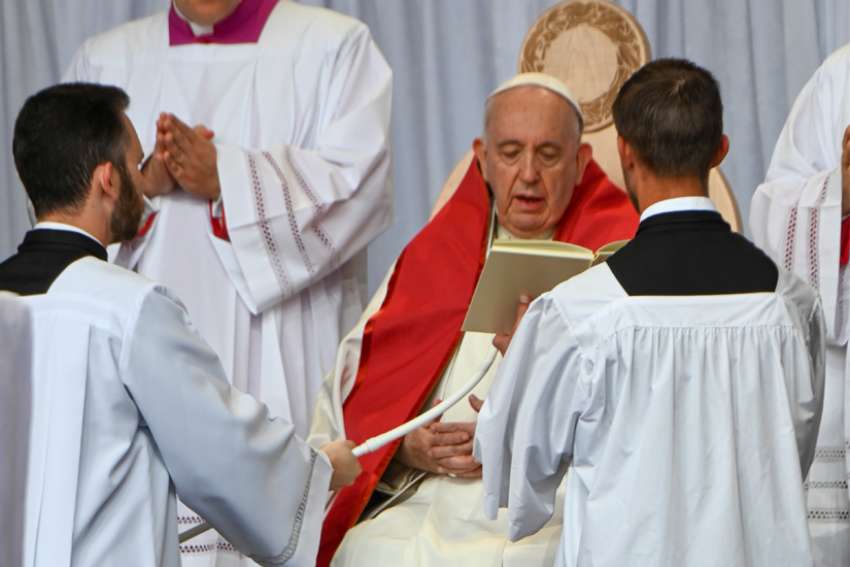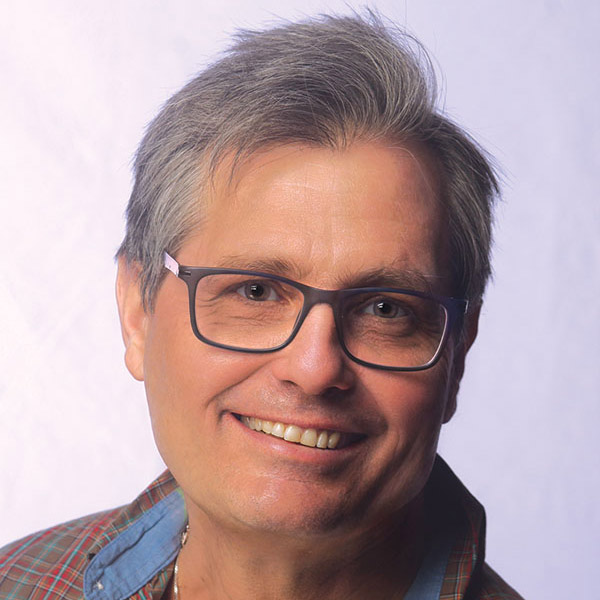Michael Swan
The Catholic Register
The Catholic Register was on scene with Pope Francis during his 'penitential pilgrimage' across Canada. See Michael's full reporting of the pope's historical visit.
At a Mass celebrating the feast of Jesus’ grandparents, Pope Francis urged those filling Edmonton’s Commonwealth to ground their understanding of history in the reality of those to whom they owed life itself.
“It was in the home of Joachim and Anne that the child Jesus came to know His older relatives and experienced the closeness, tender love and wisdom of His grandparents. Let us think about our own grandparents,” the Pope said to open his homily on the second day of penitential pilgrimage to Canada.
“Weare children of a history that needs to be preserved. We are not isolated individuals, islands. No one comes into this world detached from others. Our roots, the love that awaited us and welcomed us into the world, the families in which we grew up, are part of a unique history that preceded us and gave us life. We did not choose that history; we received it as a gift,” he added.
The pontiff’s words paradoxically underscored the depth of the apology he offered to Indigenous people a day earlier when he asked their forgiveness for the Church’s sin of being complicit in the evils of the Indian Residential School system. Many of the thousands who filled the football stadium were either survivors of the schools or their direct descendants to whom history was more horror than gift, more suffering than love.
But Francis said it was through the love, care and protection of the older generation that succeeding generations of Indigenous have been able to become “authors of a history yet to be written.” It was from the grandparents that the children could grow into freedom, he said.
“This is the mystery of human life: we are all someone’s children, begotten and shaped by another, but as we become adults, we too are called to give life, to be a father, mother or grandparent to someone else. Thinking about the people we are today, what do we want to do with ourselves?” the Holy Father asked.
“The grandparents who went before, the elderly who had dreams and hopes for us, and made great sacrifices for us, ask us an essential question: what kind of a society do you want to build? We received so much from the hands of those who preceded us. What do we, in turn, want to bequeath to those who come after us?”
See also:
The full text of Pope Francis' homily at Commonwealth Stadium
For Nancy Saddleman, just being in the presence of the Pope as he made the sign of the Cross to begin Mass was enough to make her break down in tears and seek comfort in the arms of her friend Joan DeGray. What was bequeathed to her in that moment, she told The Catholic Register, was the opening to turn back to her childhood Catholic faith.
As a survivor of 14 years at the Kamloops Indian Residential School, beginning at the age of five, immediately after her mother died, Saddleman has had a lifetime of struggle with her upbringing in a Catholic institution. Reconciling with the Church is a process. A Mass with Pope Francis is part of the process.
“I needed this so I can turn back to God,” said the 82-year-old.
Saddleman, who has taught the Interior Salish language nsyilxcən on the Okanagan First Nation for 20 years, was raised in a Catholic family that took the dictates of priests seriously. As a poor family, living on the land, eating what her father could hunt, they went hungry on Fridays rather than violate the no-meat-on-Fridays rule.
Even now, she places blame on nuns at the school she began attending at age five after the death of her mother: “It wasn’t the Church’s fault. It was the staff. It was the nuns… The nuns were all white people. Some were really mean to us. Then some were good.”
But in 2007, when the flood of stories from residential schools reached a certain point, she finally lost her trust in the Church. It has taken the intervening years, and the chance to hear the Pope apologize, that has helped her in the process of turning back to the religion of her parents and grandparents.
In his homily, Francis noted: “It was in our grandparents’ homes that many of us breathed in the fragrance of the Gospel, the strength of a faith which makes us feel at home. Because that is how faith is fundamentally passed on. This is our history, to which we are heirs and which we are called to preserve.”
Holding onto memories was precisely why Rita Fenton came to Mass at Commonwealth Stadium wearing her orange Every Child Matters shirt.
“It’s something I would like to remember,” she said.
As an Ojibway from Fort William First Nation near Thunder Bay, Ont., and a survivor of an Indian day school, she has a hard time reconciling with the Church. She goes to Church for funerals. She prays at home every morning. At 74, she’s needs something more than an apology.
“What’s ‘I’m sorry?’ ” she asks. “That’s just a word. Our abuses have happened for generations.”
For 80-year-old Marjory Loverin from Dease Lake, B.C., six years at the Laura Post Indian Residential School, and three years at Christ the King convent, taught her to watch out when people call you Indian.
“The government called us Indian. We’re not Indian,” she said. “Nobody has learned that we’re not Indian.”
Rather than seeing indigeneity as a broad category, Loverin wants other Catholics to learn to relate to Indigenous people as individuals who come from diverse cultures.
Fittingly, Francis concluded his homily with that very appeal, asking the grandparents of Jesus to intercede for us to become authors of a very different history than the past has given us.
“May they remind us of our spiritual duty to honour our grandparents and our elders, to treasure their presence among us in order to create a better future… in which the history of violence and marginalization suffered by our Indigenous brothers and sisters is never repeated. That future is possible if, with God’s help, we do not sever the bond that joins us with those who have gone before us… Let us move forward together, and together, let us dream.”



